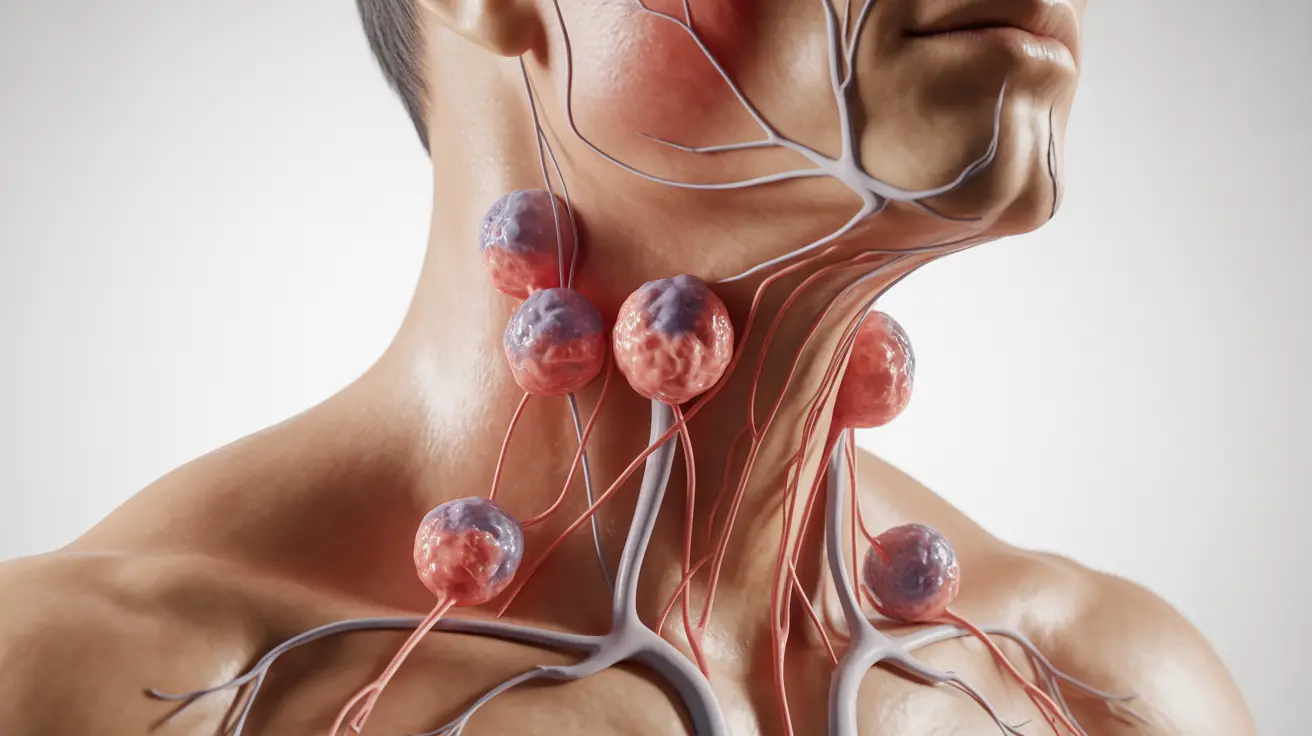If you've noticed swollen lymph nodes in your neck, you might be wondering if this could be a sign of COVID-19. While lymph node swelling isn't typically considered a primary COVID-19 symptom, understanding the relationship between these conditions is important for proper medical care and peace of mind.
This comprehensive guide will explore the connection between swollen lymph nodes and COVID-19, including vaccine-related reactions, and help you understand when to seek medical attention.
Understanding Lymph Nodes and Their Function
Lymph nodes are small, bean-shaped organs that play a crucial role in your immune system. They help filter harmful substances and produce immune cells to fight infections. When your body is fighting an infection or responding to an immune trigger, these nodes can become swollen and tender.
COVID-19 and Lymph Node Swelling: The Connection
While swollen lymph nodes aren't among the most common COVID-19 symptoms, they can occur in some cases. This typically happens as part of your body's immune response to either the virus or the COVID-19 vaccine.
Primary COVID-19 Symptoms vs. Lymph Node Swelling
The most common COVID-19 symptoms include:
- Fever or chills
- Cough
- Shortness of breath
- Fatigue
- Loss of taste or smell
- Muscle aches
Lymph node swelling, when present, is usually accompanied by other typical COVID-19 symptoms.
Vaccine-Related Lymph Node Swelling
Many people experience swollen lymph nodes after receiving the COVID-19 vaccine. This is actually a normal sign that your body is building protection against the virus. The swelling typically occurs on the same side as the vaccination site and is more common in the armpit area, though it can extend to the neck.
Timeline and Resolution
Vaccine-related lymph node swelling usually:
- Appears 2-4 days after vaccination
- Peaks around 7-10 days
- Resolves within 2-4 weeks
Other Common Causes of Neck Lymph Node Swelling
Swollen lymph nodes in the neck are more commonly caused by:
- Upper respiratory infections
- Strep throat
- Common cold
- Tooth infections
- Mononucleosis
- Ear infections
When to Seek Medical Attention
Contact your healthcare provider if you experience:
- Lymph node swelling lasting more than 2-4 weeks
- Nodes that are hard, fixed in place, or rapidly growing
- Accompanying fever, night sweats, or unexplained weight loss
- Difficulty breathing or swallowing
- Redness or warmth of the skin over the nodes
Frequently Asked Questions
Is a swollen lymph node in the neck or under the jaw a common sign of COVID-19, or could it be caused by something else? While swollen lymph nodes can occur with COVID-19, they're more commonly caused by other infections like upper respiratory infections or strep throat. COVID-19 typically presents with other primary symptoms first.
What are the most common symptoms of COVID-19, and how do they differ from swollen lymph nodes in the neck? The most common COVID-19 symptoms include fever, cough, fatigue, and loss of taste or smell. Swollen lymph nodes alone are rarely the primary symptom of COVID-19.
Can you get swollen lymph nodes in your neck after the COVID-19 vaccine, and is this cause for concern? Yes, swollen lymph nodes are a normal reaction to the COVID-19 vaccine. This indicates your immune system is responding appropriately and building protection.
How long do swollen lymph nodes from COVID-19 or the vaccine usually last, and when should I see a doctor? Vaccine-related swelling typically resolves within 2-4 weeks. If swelling persists beyond this time, or if you experience concerning symptoms like fever or rapid node growth, consult your healthcare provider.
What other infections or conditions can cause swollen lymph nodes in the neck, and how can I tell them apart from COVID-19? Common causes include upper respiratory infections, strep throat, tooth infections, and mononucleosis. These conditions usually have distinct symptoms and can be diagnosed through medical examination and testing.




